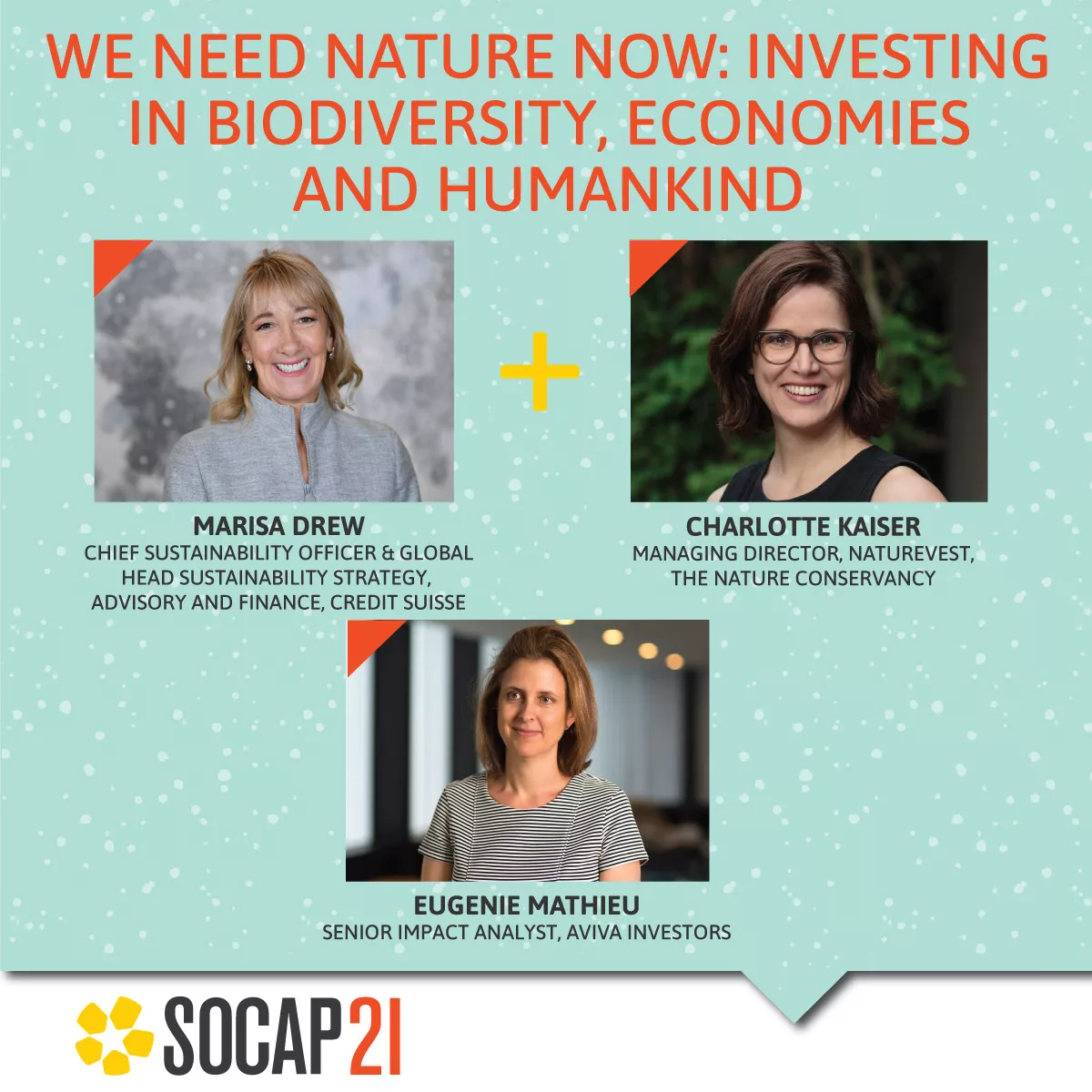A strong and growing economy requires a healthy and thriving environment. Because nature supports more than half of the annual global gross domestic product, impact investors are growing more aware of and concerned about the effects of a disrupted planet on companies and societies and the role of impact investing to protect biodiversity and address the climate crisis.
Leaders in finance, sustainability, and natural capital shaped the SOCAP21 session to address the fact that biodiversity — the animals, plants, and other forms of life in a region — is on the brink of collapse and how this crisis can shape a necessary rethinking of business as usual. They shared how investors at all levels, especially impact investors, can and are taking action to tackle the climate crisis and shift capital for positive environmental action.
Eugenie Mathieu, Senior Impact Analyst at Aviva Investors, said the Earth is now experiencing the sixth great extinction due in part to business and agricultural practices. “Globally, we’ve had a 68% drop in species since 1970. That’s shocking, and also we must recognize there is no business without nature,” she said. “Unlike with fossil fuels, where if you reduce your fossil fuels you save money, nature is free; destroying it is free. Companies are reluctant to increase their costs, but with changing regulations and changing consumer demands, it won’t be possible to keep destroying nature.”
To help enable and encourage those changes for impact investing to protect biodiversity, Aviva Investors is broadening its work with projects that avoid harm, create solutions, and transition companies to reduce impact and shift toward more regenerative and beneficial practices. “We’re trying to identify leaders and potential leaders who are setting targets and have strong biodiversity policies,” Mathieu said.
Because biodiversity is distinct according to geographies, it can be challenging to standardize policies or practices for businesses and impact investors to protect biodiversity, said Oliver Withers, Biodiversity Lead at Credit Suisse AG. “Certain markets are going to have more exposure than others in dependence on biodiversity,” he said. “When macro conditions start impacting the micro, i.e. our clients, that’s a long-term challenge. Not just for us, but for all banks. We collectively have a responsibility to drive that change that is necessary.”
That makes it critical to account for the risks that biodiversity loss presents for the bank and its clients and incorporate those factors into decision-making and impact investing, Withers said, while also seeking new or innovative options to support and scale. “We’re seeing environmental entrepreneurs come to market, and we need more of those, quite frankly, and that’s an opportunity,” he said. “As a bank that prides itself on investing in entrepreneurs, this investment is an opportunity.”
The complexity of these investments can be intimidating for some investors and can mean adopting a different mindset, said Charlotte Kaiser, Managing Director of NatureVest, the in-house impact investing team at The Nature Conservancy. That makes it important to determine how to price biodiversity risk and value biodiversity returns.
“There are ways of doing business that can deliver biodiversity outcomes in a way where financial returns are either enhanced or not impacted — interventions that require scientific and technical expertise,” she said. “It’s a long-term versus short-term perspective. … We do need more brave investors. The thinking that got us here is not going to get us out of here.
Watch We Need Nature Now: Investing in Biodiversity, Economies and Humankind
Speakers:
Charlotte Kaiser, Managing Director, NatureVest, The Nature Conservancy
Eugenie Mathieu, Senior Impact Analyst, Aviva Investors
Oliver Withers, Biodiversity Lead, Credit Suisse AG
Moderator:
Amit Bouri, CEO, The Global Impact Investing Network







